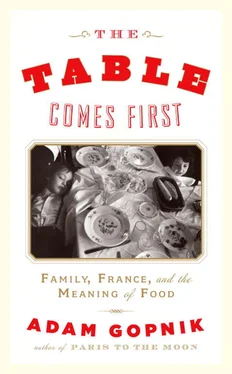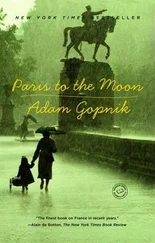The common shape of time was the same, and the real end of dinner is to articulate time. (Or, when it’s bad, to announce new kinds of tedium.) The point of eating is to slow down life long enough to promote what Brillat-Savarin called, with simple charm, good cheer. It doesn’t just take time, but makes time—carves out evenings, memories. That’s what Darwin meant when he said that we recall good dinners as happy days, wrapped like flies in a spider’s web by the silk of memory. Good dinners become happy days. Both Willy and the Hestias do that with splendor and certainty, in a time when no one else does it quite so much. They ask for your attention, not just for your appetite.
A meal at elBulli showed that the French line setting off savory from sweet could be entirely bypassed, like other French defensive lines in history, by mechanical ingenuity, speed, and superior strategic thinking. But I was still interested in desserts as such, pure desserts, desserts that always ended sweetly. And so the next morning Lisa and I traveled to meet with the young Mozart of pastry, Jordi Roca, at the restaurant he runs with his brothers, in Girona, in northeast Catalonia, about an hour from elBulli.
Where elBulli is old-fashioned and even a little run-down, as though to frame the hypermodernity of its plates all the more sharply, El Celler de Can Roca, to give the full name of the Roca brothers’ three-star place, is of exquisitely contemporary design, with small groves of poplar trees contained within the zigzagged green-glass walls of the restaurant proper. A long, low-lying wine cellar sits just across an allée of trees from the restaurant, and in it the sommelier, Josep Roca, the second brother—the oldest brother, Joan, is in the kitchen—keeps his wines in tenderly nourishing musical environments, playing recorded melodies in the caves: Bach for the champagne, romantic cello music for the Burgundys, and local guitar music for the Spanish wines.
Jordi, the baby brother, is still young-looking—startlingly so—at thirty-two. Dreamy of visage and gentle of voice, he came out of the kitchen before lunch, tentative and eager and even a little wide-eyed in his chef whites, to talk about his dessert work. He had inherited the pastry station, he admitted, because it was the younger brother’s station, but he thought that there was room to grow there. “Desserts in Catalonia don’t have the weight of the past,” he explained, in the French he had learned during several stages . “We had crema Catalana . A cake or two or three. So we felt free to invent and compete.”
After an apprenticeship at elBulli, he realized that his preoccupation was with scent. “That was something that hadn’t really been realized enough in desserts, I thought: the power of aromas. We had this new machine that could extract essential oils, and I began to play with it. I began making perfumed desserts.” He laughed. “I went to Sephora and found the most wonderful aromas in all the women’s perfumes. And I started making desserts built around their smells. Calvin Klein–like aromas. I wanted to make something as wonderful to taste as Chanel perfume was to smell. For me, that’s where all that new chemistry and equipment helps. We have the machine to extract essential oils. Another just for smokes. Working with smokes and smells, this has a—fragile aspect? Sense memory extends to the heart of who we are. I think that there’s a freedom there, for a certain delicacy.” He shrugged. “You’ll see,” he said.
Did he have a dream dessert that he had tried and failed to perfect? He nodded. “Yes, there’s one I’m working on. I haven’t really… perfected it yet. You see, I’m a big fan of F. C. Barcelona”—the soccer team—“and I wanted to make a dessert that would re-create the emotions Lionel Messi feels when he scores a goal.” Messi is the great Argentine striker who stars for Barcelona. “I feel I’m close. Could I try it out on you at the end of lunch?”
The desserts came around. And here was the real thing, here were true desserts: not dancing nimbly on the edge between sweet and salty, like Albert Adrià’, but plain old-fashioned sweets touched by the invention and audacity of a liberated imagination. There was watermelon rind with bitter almonds and tarragon; a hot lemon-mint eucalyptus liquid that, as it was poured, solidified into a small, sweet iceberg. Then lemon custard and granita, with the floral scents in a small cup alongside: you eat and smell by turns. Lemon zest, pure distilled mint flowers. And then an apricot ice-cream bombe with a spun-sugar shell, apricot foam inside, and an apricot sabayon inside that.
Finally, the server arrives with the Messi dessert, as Jordi fusses anxiously in the background. He presents half of a soccer ball, covered with artificial grass; the smell of grass perfumes the air. On the “grass” is a kind of delicately balanced, S-shaped, transparent plastic teeter-totter with three small meringues on it, and a larger white-chocolate soccer ball balancing them on a protruding platform at the very end. A white candy netting lies on the grass near the white-chocolate ball.
Then, with a cat-that-swallowed-the-canary smile, the server puts a small MP3 player with a speaker on the table. He turns it on and nods.
An announcer’s voice, excited and frantic, explodes. Messi is on the move. “Messi turns and spins!” the announcer cries, and the roar of the crowd at the Bernabéu Stadium, in Madrid, fills the table. The server nods, eyes intent. At the signal, you eat the first meringue.
“Messi is alone on goal!” the announcer cries. Another nod, you eat the next scented meringue. “Messi shoots!” A third nod, you eat the last meringue, and, as you do, the entire plastic S-curve, now unbalanced, flips up and over, like a spring, and the white-chocolate soccer ball at the end is released and propelled into the air, high above the white candy netting.
“MESSI! GOOOOOAL!” The announcer’s voice reaches a hysterical peak and, as it does, the white-chocolate soccer ball drops, strikes, and breaks through the candy netting into the goal beneath it, and, as the ball hits the bottom of a little pit below, a fierce jet of passion-fruit cream and powdered mint leaves is released into your mouth, with a trail of small chocolate pop rocks rising in its wake. Then the passion-fruit cream settles, and you eat it all, with the white-chocolate ball, now broken, in bits within it.
You feel… something of what Messi must feel: first, the overwhelming presence of the grass beneath his feet (he’s a short player); then the tentative elegance of acquired skill, represented by the stepladder of the perfumed meringues; and, finally, the infantile joy, the childlike release, of scoring, represented by the passion-fruit cream and the candy-store pop rocks. I saw Jordi watching us from the kitchen entrance. He had the anxious-shading-into-delighted look that marks the artist.
In those le Carré and Deighton thrillers, the things the antihero learns on the other side of the curtain tend to be brooded on stoically rather than applied with spirit. What you saw on the other side of the curtain stays there. What I learned in Barcelona was that genius can produce what it chooses—but not much of it was really applicable to the table I sit at or the kitchen I cook in. It wasn’t just that you can’t do this at home; it’s that home is the last place you were ever meant to do this. The earlier great changes in cooking were a kind of baroque template, suitable for simplification—you made haute cuisine with cream and butter, nouvelle cuisine by leaving them out—but “techno-emotional” cooking was created only for the three-star stage. It was pure performance, cabaret cooking, the table as stadium show. As often happens with the avant-gardists, by advancing the form they had only deepened the crisis. There was nothing that you could do with what I had learned, other than serve cake and ice cream while the soccer game was on, which we knew how to do already.
Читать дальше












